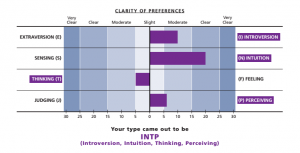Personality has power to uplift, power to depress, power to curse,and power to bless – Paul Harris
The task of reflecting on my own personality is an extremely challenging one. You know it exists, and you know it guides your everyday actions, but you very rarely look to analyze the inner workings of your personality. However, to quote Albert Einstein “You have to learn the rules of the game. And then you have to play better than anyone else.” and to me this speaks volumes toward to need to analyze and understand ones personality on a deeper level, because to be able to gain success i.e. playing better than anyone else, you must first fully understand yourself and how to leverage your personality traits i.e. learning the rules. To allow myself to do so, interpersonal dynamics has introduced me to various tools that can be used to gain a deeper understanding of my personality, and for this reflection I have chosen the following: The Myers-Briggs test and the big five.
The Myers-Briggs test
Rather ironically, after quoting Albert Einstein I actually share the same Myers-Briggs type with him, and that is INTP. Another irony that was struck home was that as an MBA student there are little-to-no well known CEO’s or business leaders with this Myer-Briggs makeup, and it seems to be a personality type exclusively for leaders in thinking and their own field such as Einstein and Immanuel Kant amongst others. The majority of the results came as no surprise to me, in that before taking the test I would have identified myself as introverted, intuitive, thinking & perceiving, the only surprise was the degree of each aspect. For the purpose of reflection, I looked to breakdown each category separately for analysis.
Extraversion Vs. Introversion
I scored relatively highly towards introversion with a rating of 10. As stated earlier this came as no surprise to me once I actually looked to understand want introversion/extraversion actually mean. The major misconception of these opposing types is that extraverts are the loudest people in the room, the life of the party and the ones likely to succeed in areas involving leadership, whereas the introverts are seen to be the quiet ones in the corner who have little social skills. However the concept of introversion and extraversion is in fact based around energy and motivation, and speaking for myself I can attest to it, and can observe serious positives that can be leveraged through the traits of introversion to better myself as a leader. First and foremost being an introvert means that my energy comes from within, this means that I am not dependent on others to build my own motivation and drive, it also means I can sit back and reflect over a situation and see the big picture a lot more naturally (I refuse to describe and attribute as better or worse as they are all simply different), the misconceptions of an introvert are further disproved as I looked deeper in to my score, and part of it shows that I have strong scores towards Gregariousness and Enthusiasm which pertain to my lively and energetic nature and my affinity to a group dynamic. This whole notion was possibly best displayed in my many years of soccer captaincy where energy and gregariousness are vital attributes to succeed, however my uniqueness as a leader came from my ability to stand back and reflect on the current situation effectively on my own, before leveraging my ability to self motivate due to introversion and then externalise that to the rest of my teammates.
Sensing Vs. Intuition
Being placed under the intuition side was of no surprise to me either, and even the severity of the score at 20 was no surprise, especially after the various tools used previously such as Competing values framework which has firmly placed me as a creative type, and that is the basis for an intuitive nature, in that it involves being original, conceptual and abstract. I think this attribute, when extreme, can often be perceived as the individual being eccentric, if you again you look at Einstein, he was very much original and forward thinking, but many would also use words such as “odd” to describe the man. I am of the belief that this one attribute is one that I should most look to leverage in building my leadership over time, as I believe many key leaders today are differentiated through innovation, and innovation is bred through this sense of originality and inventiveness. However the need for self-awareness is key when developing, because after digging deeper in to these facets I noticed I scored on the extreme ends of the continuum in certain aspects such as imaginative, and the problem that could arise through this is a lack of efficiency and staying grounded in my work, and I need to be aware that sometimes I need to alter towards these in my work for the benefit of both myself and any team I will operate within.
Thinking Vs. Feeling
This score came as more of a surprise to me, although my score was only an arbitrary 5 toward thinking, I was sure I was likely to be more of a feeler, due to the previous experiences I have had working with the orphanage in Kenya for many years, and my involvement in a team sport environment where the need to be empathetic of others needs is of paramount importance. However when looking deeper in to why I am categorized here the rationale becomes more clear, and again it is bred through my creative nature in that I look to find processes to a solution and that I tend to question generally held beliefs or theories to come to some sort of original thesis around them which is something I have always looked to do throughout my time in academia. With this being said this attribute tied with my high intuition attribute can be leveraged in to becoming a unique thinking leader, and learning to create buy-in to my novel ideas or processes will be vital to my success in doing so, also it must be wary of other peoples objectives and feelings when doing so and appreciating the need of the people around me and supporting them to also be creative forces.
Judging Vs. Perceiving
To only score a 5 towards perceiving was a big shock to me, as I have always considered myself a highly spontaneous type of individual who thrives on time constraints, and no matter how hard I try will never be able to live by a strict schedule. I often use the example of when I have to write any essay or suchlike for university, no matter if you give me 2 days or 2 months to do the same essay, I will still be in the library until 4am the morning before it is due finishing it off, and to add to that I even believe the quality of my work is far enhanced by being that way. This side of me was made clear when scoring on the extreme end of the pressure-prompted facet. There are obvious considerations and flaws that need to be acknowledged and kept in mind when trying to leverage this attribute, as although the business world itself is full of time pressures and being able to thrive under it is a distinguishing attribute to have, I do also need to be aware of my efficiency and to be aware of any long term goals that need to be reached rather than living from time constraint to time constraint.
The big five
The big five is considered by many in the field to contain the 5 foundation dimensions that shape all other personality factors, so of course when I am looking to fully “learn the rules of the game” looking at the very foundation of my personality was of great allure.
Openness to experience
This was my highest scoring attribute, and is of no surprise to me whatsoever, because I have always enjoyed novel experiences and ideas, as explained by my creativity and also the many different cultures i’ve immersed myself in throughout my life with travelling and also living in Kenya, Hong Kong & Canada. With the global and ever changing nature of business today, I think this openness will serve me well as a leader and allow me to remain mobile.
Conscientiousness
This facet describes the phenomena of organization and self-discipline, which as a general rule comes as a part of the package for a creative type, and unsurprisingly I scored low on it, which is still ironic to me considering my obsessive compulsive tendencies for order. With this short coming it means that time management and general organizational structure of tasks does not come naturally, but it doesn’t mean it can’t be built on through self-awareness of this flaw.
Extraversion
Obviously this was a-given that I would receive a low score, and the pro’s and con’s of this and how I can leverage it were discussed earlier.
Agreeableness
“I say what I think, I won’t change that for anyone else” is a phrase that has often been proudly uttered from my mouth, and therefore it explains why my level of agreeableness is low, I tend not to change my personality to suit others, although many may argue that having chameleon type attributes is vital for dealing with numerous people that you will encounter through being a leader, I believe that being authentic to yourself and letting others see that shine through is far more powerful.
Neuroticism
I have often been described by friends and colleagues as laissez-faire and it was one personality trait I was 100% self-aware of before going deeper in to my understanding, over the years I have encountered many highly stressful situations, including working in the orphanage, working in sales, personal stress such as my parents divorce and just general university stress and people have always commended me on my ability to not let it phase me, and as discussed earlier in terms of the fast paced world we live in today I take great pride in my ability to take things in my stride, however I need to be careful to not cross the line between calm and lazy.

